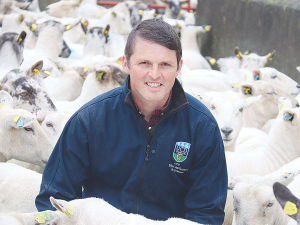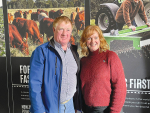Most Irish farmers are pretty much on board with the need to reduce their agricultural greenhouse gas emissions.
That's the view of one of Ireland's leading scientists in this field, Professor Tommy Boland from the University College of Dublin (UCD). He was one of just two international keynote speakers at the recent climate change conference in Wellington.
Boland has been a regular visitor to NZ over many years and is involved in collaborations with scientists in NZ and especially at Massey University.
The reason for this is the huge amount of similarity between Ireland and NZ in terms of the agri sectors to their respective economies. Both nations run similar pasture based systems to produce dairy products and meat for export.
The Irish government has set a target of 25% reduction in agricultural greenhouse gas emissions by 2030, based on a 2018 starting point. Boland says Irish farmers, like their counterparts in NZ, are looking for solutions and information on how they can achieve this target.
"They are hungry for knowledge, so as someone who works in the research sector, we have a big responsibility to generate that information and knowledge.
"There has to be a sector, not just a farmer, approach to deliver those solutions on farm and to support the farmers in the uptake and implementation of these solutions," he says.
Boland says at the moment there are a number of different technologies available such as breeding technologies, new fertilisers and fertiliser use.
He says it's predicted that if there is widespread adoption of these techniques and some others, they will deliver about one third of the emission savings needed to achieve the 2030 target.
Boland says the funding approach to dealing with GHGs is similar in both Ireland and NZ, although the mechanism is slightly different in his country. There, the Ministry of Agriculture, Food and Marine (similar to our MPI), is the main research funder, along with their Environmental Protection Agency (EPA). He says in Ireland there has been a significant investment into GHG research with emphasis on core technologies and building up expertise within the science fraternity.
Collaboration in respect of GHG research between Ireland and NZ has been going on for a long time. Boland says there are some very strong personal relationships built up between Irish and NZ scientists. In parallel to this, there are many formal funding agreements, all of which have added to the richness of the knowledge on the subject.
"These include bilateral agreements between our Ministry of Agriculture and MPI," he says.
Boland says this collaboration is likely to increase, especially with the signing of the FTA between NZ and the EU, which will give NZ access to EU research money. He also adds that there is strong collaboration between Ireland and NZ in the agritech space.
"There is always more that can be done, but I think we are in quite good space in terms of collaboration between the two countries."



















